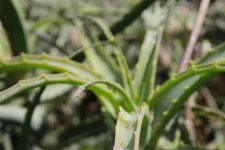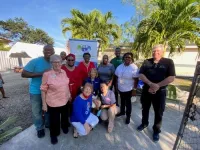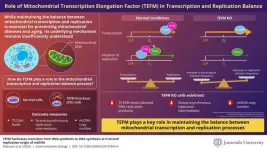(Press-News.org) Jerome E. Morris, the E. Desmond Lee Endowed Professor of Urban Education at the University of Missouri–St. Louis, has been voted president-elect of the American Educational Research Association (AERA). Morris joins the AERA Council in 2025–2026 as president-elect, and his presidency begins at the conclusion of the association’s 2026 Annual Meeting.
Morris leverages his upbringing in public housing and attending predominantly Black public schools in Birmingham, Alabama, to inform his research, which examines the intersection of race, social class, and the geography of educational opportunity, focusing on the U.S. South. A former middle school teacher and founder of a rites of passage program, Morris’s conceptual frameworks emphasize the need for authentic partnerships with historically marginalized people and low-resource communities and schools. His latest book, Central City’s Joy and Pain: Solidarity, Survival, and Soul in a Birmingham Housing Project (University of Georgia Press) melds historical and sociological analysis with poignant memoir, capturing public housing residents’ efforts to sustain their community amid the harsh realities of housing and educational inequities. Morris’s nearly three-decade career includes serving as a tenured professor at the University of Georgia (UGA) and a Fellow at UGA’s Institute for Behavioral Research.
Morris also authored the book Troubling the Waters: Fulfilling the Promise of Quality Public Schooling for Black Children (Teachers College Press) and has published in leading research journals such as the American Educational Research Journal, Educational Researcher, Review of Research in Education, and Teachers College Record. Highly engaged with AERA since 1995, Morris was inducted as an AERA Fellow in 2022, elected Division G’s vice-president for 2020–2023, elected to AERA’s Executive Board, and served as Council liaison to AERA’s Journal Publications Committee. His research initiatives have garnered funding from several distinguished organizations, including the Spencer Foundation’s Lyle Research Award to Transform Education and AERA’s grants program.
Upon becoming AERA president in 2026, Morris will succeed Maisha T. Winn, the Excellence in Learning Graduate School of Education Professor at Stanford University and faculty director of the Stanford Accelerator for Learning’s Equity in Learning initiative. Winn will assume the AERA presidency on April 27 at the close of the association’s 2025 Annual Meeting in Denver, Colorado.
Key Members Elected to AERA Council
Along with Morris as president-elect, association members elected several new AERA Council representatives.
Council Members-at-Large
Two prominent scholars were elected to member-at-large positions on the AERA Council, commencing in 2025–2026. They will serve three-year terms.
Yolanda Sealey-Ruiz, Teachers College, Columbia University
Dawn Williams, Howard University
Division Vice Presidents-Elect
Four education researchers were voted as division vice presidents-elect and will join AERA’s 2026–2027 Council, following the 2026 Annual Meeting. They will serve three-year terms.
Division B – Curriculum Studies:
Roland Sintos Coloma, Wayne State University
Division F – History and Historiography:
Yoon Pak, University of Illinois Urbana-Champaign
Division G – Social Context of Education:
Thandeka K. Chapman, University of California–San Diego
Division H – Research, Evaluation, and Assessment in Schools:
Jennifer L. Whitson, Alexandria City Public Schools
Special Interest Groups (SIG) Executive Committee
Omi Salas-SantaCruz, University of Utah, was elected chair-elect of the SIG Executive Committee. Salas-SantaCruz will serve as chair-elect in 2025–2026, and their two-year term as chair will commence at the conclusion of the 2026 Annual Meeting. While chair, Salas-SantaCruz will serve as a member of AERA Council.
Graduate Student Council
Edith P. Middleton, a doctoral student at Teachers College, Columbia University, was voted chair-elect of the Graduate Student Council and will join the AERA Council in 2026–2027.
Complete 2025 AERA election results are posted on the AERA website.
END
Jerome Morris voted AERA President-Elect; key members elected to AERA Council
2025-03-05
ELSE PRESS RELEASES FROM THIS DATE:
Study reveals how agave plants survive extreme droughts
2025-03-05
WASHINGTON — Agave plants may be best known for their role in tequila production, but they are also remarkably adept at retaining water in extremely dry environments. In a new study, researchers used terahertz spectroscopy and imaging to gain new insights into how these succulents store and manage water to survive in dry conditions.
“Understanding how plants adapt to dry conditions could lead to better farming practices and be used to develop crops that require less water,” said Monica Ortiz-Martinez ...
Aligning Science Across Parkinson’s (ASAP) launches a second funding opportunity to accelerate novel tool development to advance Parkinson's disease research
2025-03-05
The Aligning Science Across Parkinson’s (ASAP) initiative opened applications for research community members to apply for funding to develop novel tools to advance Parkinson’s disease (PD) research. The Collaborative Research Network (CRN) 2025 Technical Track grants will support the development of sustainable tools to accelerate validation and therapeutic research and discovery for emerging targets identified through ASAP discoveries, offering funding of up to $2M per year over three years, up to $6M total.
"By bringing researchers together to generate new preclinical tools for targets studied in our ASAP programs, our goal ...
New study: Eating mangos daily shown to improve insulin sensitivity and blood glucose control
2025-03-05
ORLANDO, Fla. – Mar. 5 2025 – New research has uncovered a potential gamechanger for improving cardiometabolic health: fresh mangos. A study recently published in the journal Nutrients finds that eating two cups of mango, just about 100 calories-worth, daily may help lower insulin concentration levels and improve insulin sensitivity in adults who are overweight or obese with chronic low-grade inflammation. The findings underscore how simple dietary choices could contribute to reducing the risk of chronic conditions like type 2 diabetes, ...
Highly radioactive nuclear waste – how to keep it from oblivion
2025-03-05
Sweden’s radioactive nuclear waste will be stored in a sealed bedrock repository for 100,000 years. It will be hazardous for a very long time. So how can we ensure that humanity does not forget that it is there? Researchers at Linköping University, Sweden, have come up with a proposal for how to keep the memory alive over generations.
“We’re trying to do something that no one has ever done before. The person who eventually reads this might not even be human, but perhaps a kind of AI or something ...
Generations ‘sync’ up in rural ‘glades’ to boost technology use for health
2025-03-05
Given the growing role of mobile technology in supporting older adults, it’s essential to implement initiatives that encourage its adoption among this population. However, older adults are often unfamiliar with mobile technology, especially those in rural areas with limited digital access or literacy.
To bridge this gap, researchers from Florida Atlantic University’s Christine E. Lynn College of Nursing, and collaborators, implemented a pilot study to test an intergenerational program involving high school students, older adults and local faith-based health educators in the “Glades,” a rural community nestled at the ...
Unveiling the mechanism of maintenance of replication and transcription in mitochondria
2025-03-05
Mitochondrial deoxyribonucleic acid (mtDNA) is essential for cellular energy production and overall cell function. Abnormalities in mtDNA are linked to various diseases and are also implicated in aging. Understanding the process of replication and transcription of mtDNA is crucial for improving our knowledge of human health, disease, and aging. However, the mechanisms that regulate the balance between transcription and replication of mtDNA remain unclear.
To unveil the mechanisms, a team of researchers ...
Pioneering research into brain cancer is awarded the world’s largest brain research prize, The Brain Prize
2025-03-05
Gliomas are types of cancers that arise in the brain and are extraordinarily difficult to treat. They are the leading cause of brain tumour-related deaths in both children and adults. Two pioneering scientists are awarded The Brain Prize 2025 for their discoveries that open up an entirely new way of thinking about and understanding these lethal diseases, and the potential strategies to treat them.
Copenhagen, Denmark, March 5th, 2025. Neuroscientists, Professors Michelle Monje (USA) and Frank Winkler (Germany), have made transformative discoveries by showing that neural ...
Concrete evidence: Japanese buildings absorb 14% of cement production's carbon footprint
2025-03-05
A team of Japanese researchers has discovered that Japan’s concrete structures—including buildings and infrastructure—absorb and store about 14% of the carbon dioxide (CO2) emissions generated during cement production.
This research provides vital knowledge to offset CO2 emissions from cement production, a significant contributor to global carbon emissions at approximately 8%. The study was published in the Journal of Cleaner Production.
With the growing urgency of climate change, scientists are focusing not only on reducing ...
New study examines how physics students perceive recognition
2025-03-05
ITHACA, N.Y. – Experts see peer recognition as important to student success in physics, and a new study gives college-level physics instructors insight into how students perceive the message from their classmates that “you’re good at physics.”
Even when women receive similar amounts of recognition from peers as men for excelling in physics classes, they perceive significantly less peer recognition, the researchers found. “Men are internalizing their recognition differently than women,” said Natasha Holmes, professor of physics at Cornell University.
Holmes ...
For some, childhood adversity can promote resilience to anxiety disorders
2025-03-05
New Haven, Conn. — Research has shown that young people who face adversity such as traumatic or stressful events during brain development are 40% more likely to develop anxiety disorders by adulthood. But most people who endure these experiences during childhood and adolescence prove to be resilient to these mental health effects.
A new Yale study finds that when this adversity occurs during brain development may affect how susceptible people are to anxiety and other psychiatric problems as adults.
According to the study, published March 5 in the journal Communications Psychology, ...






